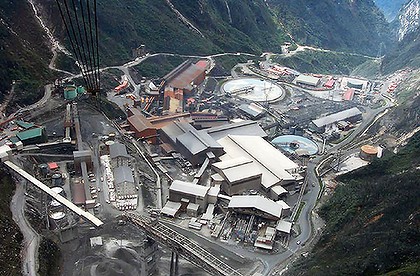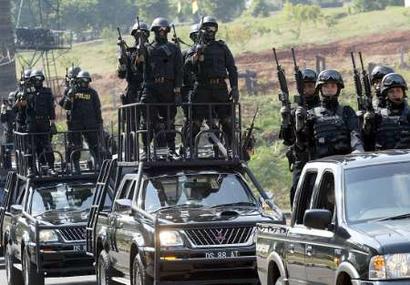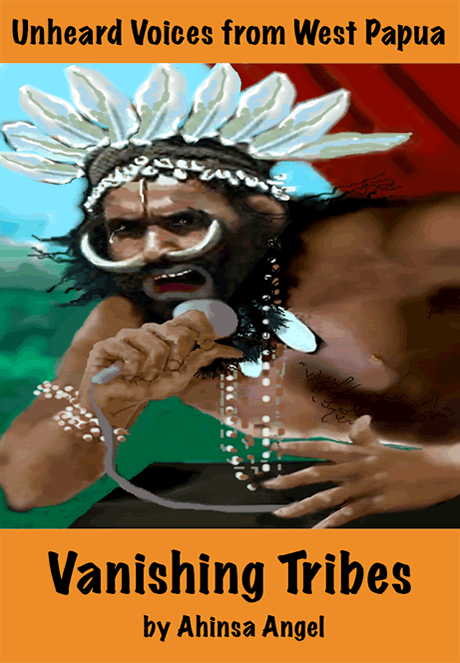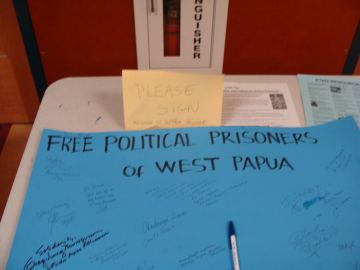
|
|
West Papua Report
|
||||||||||||||||||||||||||||||||||||||||||||||||||
As for the Papuan people, the majority are impoverished and work hard to make a living from hunting, fishing and agriculture. And as is so often the case, the women are at the bottom of the pile. |
The referendum was held in 1969 with heavily-armed
Indonesian troops in control throughout the territory, turning the "Act"
into a farce, an "act of no choice." The
result was that one hundred percent are alleged to have "voted" in favor
of the territory's incorporation into Indonesia. Since then, Papuans
have held peaceful demonstrations, flying their own Morning Star flag,
which has resulted in many hundreds of Papuans being arrested, tried for
subversion and sentenced to lengthy terms in prison.
In-migration from Indonesia
In the past two decades, tens of thousands of Indonesians have
migrated to West Papua. This has been on such a vast scale that they
will soon out-number the Papuans with serious consequences for the
economy which is now largely run by the migrants. As a result of this
influx, Papuans have become marginalized as well as suffering
discrimination in their own land.
Who benefits from West Papua's natural resources?
 |
|
| Freeport-McMoRan's Grasberg mine. |
So how rich is West Papua in natural resources? In the central highlands
of the territory, copper and gold reserves are reputed to be the largest
reserves in the world. Since the 1970s, this has been exploited by
Freeport-McMoRan, a US multi-national corporation.
So who benefits from all this? The first thing to say is that the
Papuan people are certainly not the beneficiaries. It is Freeport
McMoRan which is sitting on reserves of copper and gold. Freeport has
been exploiting West Papua's riches for nearly four decades. In 2012,
Freeport earned $2.4 billion from the sale of copper and $1.5 billion
from the sale of gold and $2.billion from copper and $1.4 billion from
gold in 2013. A significant proportion of this goes to Jakarta in taxes
and dividends from the shares the government holds in the company.
As for the Papuan people, the majority are impoverished and work hard to
make a living from hunting, fishing and agriculture. And as is so often
the case, the women are at the bottom of the pile.
The Plight of Papuan Women
In towns and cities across the Land of Papua, Papuan women are the
main source of income for the family, They spend their days selling
products in gardens surrounding their homes which are often in remote
parts of the country. But they are forced to sell their products in the
open air, on the streets, sitting on scraps of plastic. Virtually all
the well constructed markets with stalls and covers for protection
against the heat and rain are occupied by Indonesian in-migrants. Anyone
who is able to follow reports in the local media will be struck by the
many reports of women traders demanding that the authorities build
markets for them.
For example, in January this year,
a local newspaper reported that Papuan women had demanded to know
why nothing had been done by the local administration to build a
market. In a statement, they said: "We have waited for over ten years
for the government to keep their promise to build a permanent market for
us. We are the ones who give birth and rear our children." One woman is
quoted as talking about "our long struggle to make a living and pay for
our children's upbringing and education." Without this, they find it
extremely difficult to compete with the migrants who are able to sell
their wares in properly sheltered areas.
Another serious problem confronting Papuan women is the widespread
occurrence of domestic violence, which in many cases is witnessed by
their children. Most of this violence is alcohol-related.
One news agency reported that a survey conducted in December 2012
revealed that there had been "1,360 cases of gender-based violence per
10,000 Papuan women." Rarely, if ever, are these crimes reported to the
police and are perpetrated with impunity.
Moreover, these problems are rarely reported even in
Indonesia, let alone in the international media. Why is this so? The
fact is that international human rights NGOs and journalists are denied
access to the territory. On those rare occasions when a foreign
journalist is granted permission to visit West Papua, their efforts to
interview people are closely monitored by the Indonesian police and
military forces.
This is the only place in Indonesia which is inaccessible to outside
investigation. As is abundantly clear, this is because the Indonesian
government has so much to hide about the political, economic and social
conditions in West Papua.
* Carmel Budiardjo is the founder of
TAPOL which has long
campaign for human rights in Indonesia. In 2008, Budiardjo was
the first recipient of the West
Papua Advocacy Team's John Rumbiak Human Rights Defenders Award.
UPDATE
Indonesia's Official Human
Rights Organization Focuses on Indigenous Ancestral Land Rights
"The national inquiry is a way to resolve human rights issues systematically, in which indigenous peoples and representatives of the private sector will be invited to discuss and seek mediation, negotiation and solution," Sandrayati Moniaga, a Komnas HAM, member said at the launch of the inquiry. Around 140 cases have been reported to Komnas HAM as part of the inquiry. The inquiry will propose regulation and policy changes.
For decades the government has granted concessions to large tracts of land inhabited by indigenous people to foreign and domestic companies involved in the mining, palm oil, and pulp and paper industries. These land grabs extend back to the 1960's when Indonesia first occupied West Papua and granted U.S. mining giant Freeport McMoran rights to lands belonging to the Amungme and Kamoro peoples. The ensuing struggle by dispossessed indigenous groups to defend or regain control of their ancestral lands has met with fierce repression by Indonesian security forces, often working on behalf of the concession holders. This strife has led to the displacement and death of thousands of Papuans.
The Indonesian government has largely ignored a landmark 2012 edict by the Constitutional Court altering a 1999 law on forestry and land ownership that effectively removed state control of indigenous lands and gave control to indigenous groups.
Former Constitutional Court justice Ahmad Sodiki said the land ownership rights of indigenous people and of the state should be clearly separated. "The government should prioritize the indigenous people's land first, then claim the rest of the forested land as the state's," he said.
Abdon Nababan, the secretary general of the Indigenous Peoples Alliance of the Archipelago (AMAN) urged the government to become more involved with indigenous communities. "I should say that AMAN, Komnas HAM, environmental affiliates and other non-profit organizations have been the ones quelling [the conflicts prompted by land rights disputes]," he said. He was very critical of legislation that disenfranchised indigenous peoples. Under those laws, he said, "two-thirds of our forest land is governed by the Forestry Ministry and the rest by the National Land Agency," or BPN.
Police indiscriminately shoot civilians in Nabire, injuring three Papuans
The Asian Human Rights Commission (AHRC) issued
an emergency appeal on
May 8
concerning the indiscriminate shootings of civilians in Moanemani,
Nabire, Papua by police. Three civilians were critically injured.
A group of civilians visited the headquarters of the Mobile Brigade of
Moanemani Sub-District Police on May 6 to demand the police hand over a
truck driver who was responsible for a traffic accident in which two
villagers were killed earlier the same day. The truck driver was hiding
at the police station for his safety. When the police refused, a group
of civilians - including family members of the accident victims -
started throwing stones on the police station. The police responded by
opening fire at the civilians, injuring three A reverend who was present
during the shootings recalled that it was not just "one or two shots"
but more like rain of bullets. Local sources contest the police claim
that the police initially fired into the air as warning.
The AHRC points out that "under international law, the use of lethal
weapons by law enforcement officials is subjected to the strict tests of
necessity and proportionality. The proportionality test requires law
enforcement officials, such as the police, to only use lethal weapons if
it is required to protect life. The necessity test, in the other hand,
requires the officials to only use lethal weapons when there is no other
means - such as capture or nonlethal incapacitation - of preventing such
threat to life (Report
of the UN Special Rapporteur on extrajudicial, summary or arbitrary
executions, A/HRC/14/124, 20 May 2010, para. 32)."
The AHRC urges that letters be sent to Indonesian authorities "asking
them to ensure that an effective and impartial investigation on this
case to take place." AHRC also urges that writers also "use this
opportunity to call for the establishment of an independent mechanism to
review the use of lethal weapons by the police in Indonesia."
To support this appeal, please go here:
http://www.urgentappeals.net/support.php?ua=AHRC-UAC-068-2014
Paula Makabory, from the Institute for Papuan Advocacy and Human
Rights in Australia,
called
"The series of incidents in Moanemani highlights how
military-style policing perpetuates the endless cycle of violence in the
50 year Indonesian occupation of West Papua."
The Institute for Papuan Advocacy & Human Rights has published
a
chronology of events.
Anonymous Takes on Indonesia
The global "hacktivist" network Anonymous has launched a campaign to focus attention on censorship and the killings of indigenous Papuans. Anonymous is widely known for its often disruptive efforts to draw attention to various nefarious activities by governments and corporations. In announcing its campaign Anonymous stated that Indonesia's government and military have for too long silenced Papuans. The organization also cited the failure of the United Nations to take responsibility for the "Act of Free Choice," the sham referendum devised by Indonesia in 1969 to deny Papuans the right of self-determination.
Anonymous has
especially targeted Indonesian government websites. The group is asking
for a UN peacekeeping force, the withdrawal of all non-organic
Indonesian troops in West Papua, and a free and fair referendum so
Papuans can decide their own destiny.
More
https://twitter.com/OpMerdeka
Calls for Action as UN
Decolonization Body Meets
The United
Nation's Special Committee on Decolonization held its Pacific Regional
seminar in Fiji, May 21-23. The theme of this year's meeting was
accelerating the implementation of the Third International Decade for
the Eradication of Colonialism (2011-2020).
The seminar reviewed the situation with respect to the 17 territories
listed on the Special Committee's agenda. The committee, also known as
the Committee of 24, will hold its regular meeting in June in New York.
The seminar prompted calls for it to consider the plight of West Papuans living under Indonesian control. However, a review of the UN's summary of the seminar proceedings indicated that the plight of Papuans was not raised. See here and here.
Joe Collins of the Australia West Papua
Association
urged
the UN committee to make a fact-finding trip "to investigate how the
West Papuan people have fared under Indonesian rule" just as it traveled
to New Caledonia in March of this year. He said, "It is an accepted fact
that the so called act of free choice in 1969 was a farce and the UN has
a moral responsibility to the West Papuan [people] for that tragic
event"
Collins
told Radio New Zealand that "It's your duty, a moral obligation to go and visit West Papua, see what
51 years of administration has done to the West Papuan people, the
exploitation of the resources but little or no benefit to themselves,
ongoing human rights abuses. They should go and see how the West Papuan
people have fared after 51 years."
On the eve of the seminar, the Pacific Regional Non Governmental
Organizations Alliance (PRNGO)
called for indigenous people in Guam, New
Caledonia, French Polynesia, Tokelau and West Papua to be allowed to
chart their own future. PRNGO spokesperson and Pacific Council of
Churches official, Peter Emberson urged Pacific islanders to stand up,
speak out and actively engage in the struggle.
West Papuan self-determination is not just political empowerment but also socio-economic empowerment. The lack of access to quality education and healthcare and infrastructure adds to the already documented human rights abuses by the Indonesian military. |
The Pacific Network on Globalization (PANG)
called for the
UN "to reinstate West Papua on the list of non-self-governing
territories" PANG said that "ongoing gross human rights violations and a
failure of governance on the part of the Unitary Republic of Indonesia" make this urgent.
(See also below.)
At a media conference prior to the meeting, Peter Emberson of the
Pacific Council of Churches
said that "We continue to receive reports of
torture, violence and atrocities against the people of West Papua and
these actions by Indonesia must stop." He said that
West Papuan self-determination is
"not just political empowerment but also socio-economic
empowerment... The lack of
access to quality education - most children only attend school until
they are 10 years old, according to one source, health-care and
infrastructure adds to the already documented human rights abuses by the
Indonesian military."
He added that "Churches need to not only resound the call for
self-determination but get involved through education, health-care and
communications mission work. These were an important part of our growth
towards our own self-determination."
Indonesia President's Upcoming
Fiji Visit
An academic specializing in Indonesian
politics and history
says
that President Yudhoyono's planned visit to Fiji next
month can be seen through what he calls the "West Papua prism." Dr. Richard Chauvel of Melbourne's Victoria University says Indonesia is
keen to forge closer ties with Pacific countries. He notes that Jakarta
has stepped up its lobbying in the region since the Melanesian Spearhead
Group (MSG) began considering a membership application by West Papuans.
"The way the (MSG) Foreign Ministers visit (to West Papua) was
hosted; you'll remember (PNG Prime Minister) O'Neill was in Jakarta when
the MSG meeting was held. But clearly it has longer term strategic
ambitions beyond its difficulties in West Papua," he said.
Problems Faced by Sinar Mas Plantation Workers
The Catholic Church's Secretariat for Justice and
Peace (SKPKC) in Jayapura in mid-May organized a meeting in the
Juk-Lereh church for employees of PT Sinar Mas, which runs a massive oil
palm plantation in West Papua.
A local parish priest Hendik Nahak said that problems at the oil palm
plantation are covered up by the company. These range from a failure to
respect workers' rights, deceptive recruitment, inadequate clean water,
and less than habitable accommodations. Workers present in the meeting
confirmed these complaints and noted that they were longstanding and
generally ignored by the company.
Problems include recruiting company workers through promises that often
go unmet. Workers must sign agreements accepting all company decisions
concerning their wages and other working conditions. Wages are docked
without explanation. Two and sometimes three worker families are
required to share very small houses. The nearby river is polluted by
spraying from company aircraft, forcing families to rely solely on rain
water.
Source:
SKP Jayapura,
english
translation.
New Zealand Police Training Program in West
Papua Put on Hold
If we're spending taxpayers money supposedly to help the citizens, then we want to have our journalists scrutinize it. I don't think Indonesia wants that scrutiny. |
New Zealand's Ministry of Foreign Affairs and Trade
announced in
late May that Indonesia has withdrawn support for the "Eastern Indonesia
Community Policing Program" which has been planned to launch in early
2014. The $6.3 million program had been strongly
criticized by
the Green Party of Aotearoa New Zealand.
Green MP Catherine Delahunty said "one of the reasons
that Indonesia may have gone cold on the project, is that the New
Zealand government, under pressure, conceded that it might be possible
for journalists to scrutinize this project, which is something that the NGOs and the Green Party have been calling on consistently...
If we're spending
taxpayers money supposedly to help the citizens, then we want to have
our journalists scrutinize it... I don't think Indonesia wants that
scrutiny."
Delahunty said called the situation "contaminated," adding
that "the New Zealand policing model was not going to help. You have a
violent police force which is basically mandated by the state of
Indonesia to breach human rights on a daily basis and so we thought that
this was going to be a farce and a serious waste of money."
She added that "I think the program would whitewash their
reputation." West Papuans under occupation say that this is "aid that kills."
This aid will do "nothing to improve the behavior of the
Indonesian and Papuan military police against the citizens and it
potentially whitewashes a regime that needs to be imposed."
Australian Government Urged to Mitigate Culpability
for Rights Violations Abroad
 |
|
| Detachment 88 |
The Australian Human Rights Law Centre
has called on the Australian
Government to enact laws that minimize the risk of Australian police or
military assistance being used to support human rights violations.
The center's Director of Communication, Tom Clarke, called for a review
of Australia's support of Indonesia's counter-terrorism unit, Detachment
88, the notorious unit was created at the behest of and with broad
support from the United States and Australia.
"The Australian public can have no confidence that adequate steps are
being taken to ensure Australia is not in any way complicit with human
rights abuses occurring in Indonesia's Papuan provinces," Clarke said.
He add that countries have an obligation under international law to
conduct due diligence to identify the "risks and potential
extraterritorial impacts of their laws, policies and practices on the
enjoyment of human rights."
Australian-supplied helicopters were among aircraft used to carry out
napalm and cluster bombing in the West Papuan highlands during the
1970s. (WPAT Note: U.S.-provided aircraft including A-10 Broncos also
were employed in devastating assaults on Papuan civilians in
that period.)
"West Papua: no-one's
colony"
The Pacific Network on Globalization (PANG) has
called for
reinstatement of West Papua to the UN list of non-self-governing
territories. West Papua "satisfies the criteria for being reinstated on
the list," PANG wrote.
- "Specifically, West Papua is geographically separate from Indonesia. Papuans are culturally and ethnically distinct and they have had a different historical experience from Indonesians. The former colonial authority, the Netherlands, prior to the current colonial administration, the Unitary Republic of Indonesia taking control, established a national parliament - the Nieuw-Guinea Raad - paving the way for Papuans to progress towards self-rule. Sukarno, a former Indonesian president tacitly acknowledged West Papua's sovereignty when he referred to West Papua as a Dutch 'Puppet State' prior to launching a military invasion."
PANG's statement concludes that "Papuans have not given up. Even
more remarkably, the overwhelming majority have chosen to pursue their
aspirations for freedom through a combination of unarmed civilian based
resistance and diplomacy. Instead of ensuring West Papuans' safety and
security the Indonesian state is endangering their lives."
Papuan Seeks Support at UN Indigenous
Forum
Julianus Septer Manufandu, Chair of the Steering Committee of the Papuan
NGOs Cooperation Forum
told the Third Session of the United Nations
Permanent Forum on Indigenous Issues in New York that he wanted "to
convey the cries and pleas of the Melanesian people in West Papua, who
are still in pain and suffering from injustice, discrimination, human
rights violations, environmental degradation, marginalization and land
grabbing by companies supported by the government of Indonesia and state
security forces for almost 50 years under Indonesia rule." Also
representing the Papua Customary Council, he called for West-Papua to be
re-inscribed to the list of non-self-governing territories, and "that the
Government of Indonesia should ensure the recognition of the indigenous
peoples land, benefit from freedom of expression through the adoption
of the Bill on the Rights of Indigenous Peoples currently being
considered by the parliament."
Vanishing Tribes eBook
 |
A newly released illustrated, interactive eBook is now online. The
70-page online graphic novel, Vanishing Tribes: Unheard Voices from
West Papua, tells about Papua's struggle for freedom through the
fictional stories of West Papuan activists.
Originally designed for the iPad,
Vanishing Tribes is now
available for nearly all types of computers, tablets and smartphones.
All versions of the eBook are freely available through
http://www.vanishingtribes.net/.
The eBook can be read on several levels, by skimming the story and
scanning the
60 colorful paintings that illustrate it or by reading the full story.
One can also delve deeper
by opening the embedded explanatory footnotes and image descriptions.
A companion website offers additional information and links to
resources.
West Papua's New Dawn?
West Papua's New Dawn? is a new 26-minute program by veteran Australian journalist Mark Davis. In it he probes human rights violations taking place in the territory. Watch here, transcript here.
Link to this issue:
http://etan.org/issues/wpapua/2014/1406wpap.htm
Back issues of West
Papua Report
|
Support Unconditional Release of West Papua Political Prisoners |
|
Congratulations to The Act of
Killing on its Oscar Nomination TAKE ACTION: Join the Say Sorry for 65 Campaign |
|
|
|
|
| Blu-Ray (2 discs) | DVD (2 Disc) |
|
|
|
||||
 |
ETAN's other twitter accounts: |
||||
|
|
||||
|
|
||||
|
ETAN's Key
Contact List |
Action alerts, media releases, key news and other resources on East Timor (Timor-Leste) and Indonesia selected by ETAN, focused on ETAN's program and priorities | ||||
|
Subscribe to
ETAN's e-mail Listservs on Timor, West Papua and Indonesia human rights |









